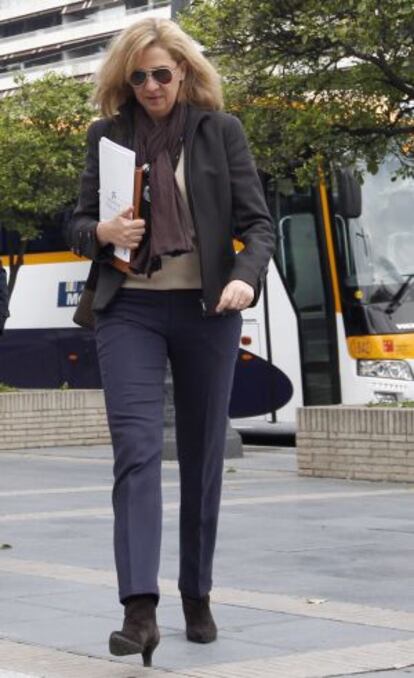State and judiciary team up to manage Princess Cristina’s court date
Royal Household decided best course of action was not to appeal against summons

All the machinery of the state has been brought in to aid the besieged Princess Cristina and to avoid, for the first time in history, a member of the royal family being placed in the dock. The operation involves the justice and interior ministries, the Tax Agency, and the Attorney General’s Office, and also counts on the support of the main opposition party and the prosecutor in the case against the princess’s husband, who is convinced the king’s daughter is beyond reproach. The final outcome was the decision not to appeal against Judge José Castro’s summoning of Cristina to give testimony and to accept that it “fulfills the desire of Spanish society.”
To reach this point the princess’s objections and those of Miguel Roca, the lawyer entrusted with her defense, had to be overcome. To defend Cristina de Borbón it was necessary to isolate her interests from those of her husband, Iñaki Urdangarin, and his erstwhile business partner, Diego Torres, who stand accused of embezzlement and fraud. The strategy also seeks to leave Torres’s wife, Ana María Tejeiro, to one side. The illogical failure of Urdangarin’s legal team to have Tejeiro sidelined in the case led to a war of words in email form that drew the gaze of the judge toward the infanta.
Cristina’s defense has been extended to include the “boutique” services of Molins & Silva, a small legal firm that tailors its work to the client. Its first action was a successful one: to get the judge’s initial subpoena quashed. But this led to an eight-month probe into the princess’s finances. In that time, the Urdangarin case became the Cristina de Borbón case. Along the way, in July 2013, the lawyer acting for Balearic regional government, Mari Ángeles Berrocal, experienced in corruption cases and in working with Judge Castro and lead prosecutor Pedro Horrach, was replaced by Antonio Perello, a known PP supporter. The official line was a “a redistribution of responsibilities to optimize resources.”
Two months earlier, the then-director of the Tax Agency, Beatriz Viana, ignored a request from Castro to keep a customs officer who had worked on the Palma Arena case — from which the Nóos case emerged — seconded as a judicial auxiliary. Two inspectors put forward as expert witnesses by the agency were not met with much enthusiasm by Castro. Viana subsequently resigned over the erroneous report that Princess Cristina owned 13 estates in Spain.
The king and the head of the Royal Household have been kept abreast of developments
Experts have now drawn up 10 separate reports on the front companies used by Urdangarin and Torres, which conclude that only the people behind these companies should be targeted. On that basis, they say, if Cristina was placed on the books of one of these companies, Aizoon, it was to hide the activities of Urdangarin and Torres.
The king and the head of the Royal Household, Rafael Spottorno, have been kept abreast of developments and meetings between Horrach and his superiors, including Attorney General Eduardo Torres-Dulce, who has also publicly stated he does not believe there is any substance in the accusations against Cristina. However, the king and Spottorno both concurred that not appealing against her second summons was the correct course of action.
Last week Horrach met with the experts who will participate in the princess’s testimony to hammer out the form the questioning will take. What remains unknown about her court appearance, scheduled for February 8, is whether the king’s daughter will have to walk through the front door of the Palma de Mallorca courthouse. The director general of police, Ignacio Cosidó, said in an interview Monday that the security deployment was being determined. “It will guarantee the security of the princess and everyone who will attend,” he said. “It is perfectly organized and designed.”
Tu suscripción se está usando en otro dispositivo
¿Quieres añadir otro usuario a tu suscripción?
Si continúas leyendo en este dispositivo, no se podrá leer en el otro.
FlechaTu suscripción se está usando en otro dispositivo y solo puedes acceder a EL PAÍS desde un dispositivo a la vez.
Si quieres compartir tu cuenta, cambia tu suscripción a la modalidad Premium, así podrás añadir otro usuario. Cada uno accederá con su propia cuenta de email, lo que os permitirá personalizar vuestra experiencia en EL PAÍS.
¿Tienes una suscripción de empresa? Accede aquí para contratar más cuentas.
En el caso de no saber quién está usando tu cuenta, te recomendamos cambiar tu contraseña aquí.
Si decides continuar compartiendo tu cuenta, este mensaje se mostrará en tu dispositivo y en el de la otra persona que está usando tu cuenta de forma indefinida, afectando a tu experiencia de lectura. Puedes consultar aquí los términos y condiciones de la suscripción digital.








































